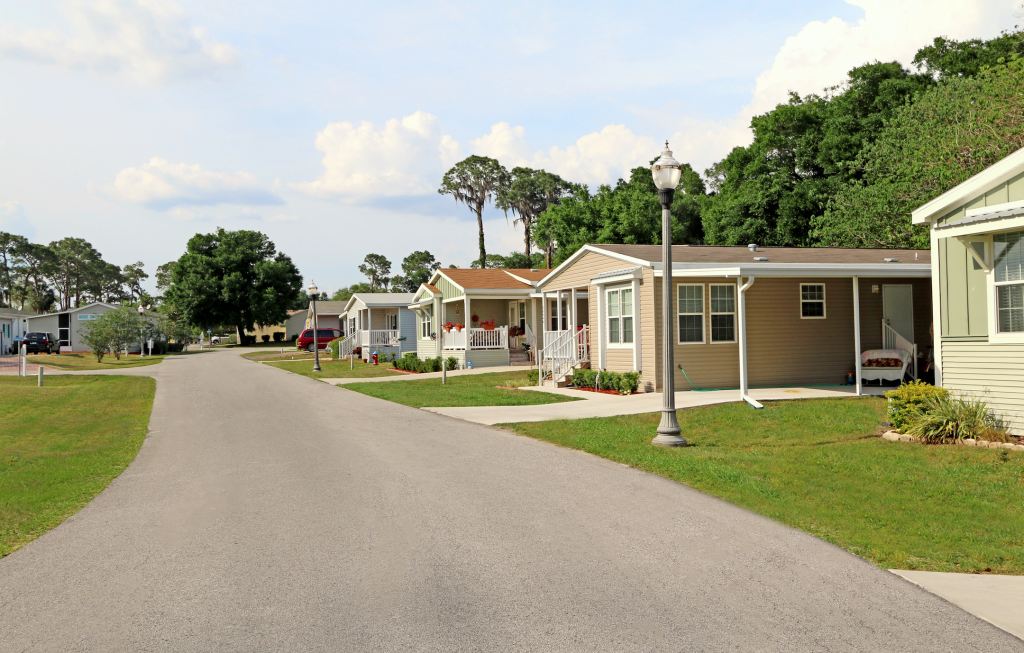There has never been a better time to sell a mobile or manufactured home park than right now

The need for affordable housing is at an all-time high as baby boomers retire in record numbers, home prices hit historic highs, and fewer affordable housing units are being supplied to the market for either the low-income or 55+ segments.
In addition, interest rates remain low, at least for the time being, and recent publicity about the opportunity mobile home parks provide — and the need they fill — has prompted increased demand across the country, and investors are taking notice.
While the demand for manufactured home properties as investments is rapidly growing, the supply is not. The inventory of available manufactured home parks is low and decreasing. The barriers for new entrants are high, and the path to approval and profitability for new developments can be long and difficult.
This high demand versus the supply/inventory dynamic is driving prices for mobile home communities higher than ever with record prices being achieved across the spectrum.
It’s a seller’s market
If you’ve been thinking about selling your community, now is the time
Whether you’re ready to retire or simply interested in moving into another property class, there has never been a better time to sell your mobile home park than now.
Regardless of the optimum market conditions, there are other factors every seller should consider.
As a seller-focused broker, the three questions I get asked most are:
- How do I know how much my property is worth?
- How do I get the highest sales price for my property?
- How do I reduce my tax liability?
It’s important to note that a seller’s market provides owners the opportunity to get a great price, but it doesn’t guarantee it.
To leverage that opportunity and maximize your property’s sales price and proceeds, there are three things you must do:
- Increase the number of prospects and competition for your property
- Know how much your park is worth and how much to ask
- Mitigate your taxes
Let’s take a closer look at these three areas and how they can impact your bottom line.

How to Get the Best Price
While all sellers want the best market price, not all will get the best available market-driven price. Make sure you do by selling your property through a seller-focused broker, also known as a seller’s representative or listing agent.
As I mentioned earlier, I am a seller-focused broker, but I am not making the recommendation for my benefit. There are several reasons to work with a seller-focused broker, all of which can have a significant impact on your bottom line.
Leverage: There are buyer-focused brokers and seller-focused brokers. A buyer-focused broker, also known as a buyer’s agent or representative, does as their title implies. They represent the buyers and their interests first, not the seller’s interests. Their primary objective is to get their buyers the lowest possible price for the property at terms that are most beneficial to them. This is great for the buyer but not the seller. The result: Your property sells for less than it should.
A buyer’s agent also wants to market your property exclusively to their buyers so they can maximize their commission in what is called an off-market deal. Because off-market deals are offered only to a closed and small pool of potential buyers, competition for your property will be minimized. They are essentially taking your property off the current seller’s market.
In addition to being at a disadvantage by working with an agent whose primary goal is to get the buyer the best deal, off-market deals keep the price of your property artificially low, typically extend the length of time it takes to sell your property, and puts you at a disadvantage at the negotiating table. We’ve seen deals bounce around for 6 to 12 months while the comings and goings of potential buyers disturb and unsettle the tenant base, and as buyer’s agents try to make the deal work with their limited portfolio of prospects.
It’s a seller’s market, so don’t give up your leverage!
Your Advantage: The competitive environment is prompting buyers to approach owners/sellers directly. They are doing this for two reasons: To avoid paying full price for your property and to put themselves at an advantage.
While it may seem that negotiating directly with a potential buyer allows you greater control, it puts the unrepresented seller in an non-beneficial position by:
-
-
- Reducing or eliminating competition for your property
- Putting the burden of establishing the value and setting the price for the property on you
- Taking time and money to draft the sales and other documents
- Having to directly negotiate the deal without the market data and expertise that will support your obtaining the best price for the property
- Ensuring you are protected on the path to closing
-
Your Interests: A seller-focused broker, also known as a seller’s agent or representative, puts the seller’s interest first. They will:
-
-
- Broadly yet discreetly market your mobile home park to all relevant buyers (This is particularly important since the best buyers often come from outside the market/region.)
- Create a competitive environment for your property
- Conduct a proper value analysis on your property to set the right price
- Shorten the time it takes to close on your deal
- Have market comps and data available to support your property’s sales price
- Increase the number of qualified offers you receive
- Provide guidance and ensure you are properly and beneficially represented from beginning to end
- Get the best price and terms for you, the seller
-
How to Find Out How Much Your Park Is Worth
Knowing how much your mobile home park is worth today, including its intrinsic and market value, and how much to ask, is essential. The analysis is extensive and has to be backed by market data and property variables such as:
- Size of the property
- Location
- Occupancy rate
- Cash flow
- NOI
- Private vs public utility connectivity
- Park-owned homes vs lot rentals
- Amenities
- Financing availability
- Market conditions
- Available on-market inventory of similar properties
- The price/value of other comparable properties that sold in your market
- The asking price of other on-market properties
The best way to arrive at the proper price is through a market analysis. A market analysis includes all of the considerations listed above to arrive at a market-driven price, while many appraisals can place more weight on the intrinsic value of a property. The difference is akin to looking backward through the rearview mirror with an property appraisal versus looking forward through the windshield with a market analysis.
Look for a seller-focused broker that will provide you with a no-obligation market analysis that shows you the cap rates of other properties that have sold in your market, as well as the potential cap rates for your property.
The desired cap rate dictates the purchase price and is one way to measure the efficiency of your sale. To find the cap rate, divide your property’s NOI by the Sales Price. To find your Sales Price, divide your NOI by the desired cap rate. For sellers, the lower the cap rate, the higher your return because it means the sales price was higher.
Cap Rate = NOI/Sales Price
A ½ point difference in the cap rate can mean millions of dollars less or more in your pocket.
How to Mitigate Your Taxes
Now that you’ve optimized your price and capital gains, mitigating your tax liability after the sale can and will have the most significant impact on your pocket.
1031 Exchanges
One of the most common ways owners reduce their tax liability is by using the provision in the Internal Revenue Code (IRC) Section 1031, which allows you to postpone paying tax on the gain if you reinvest the proceeds in a similar property as part of a qualifying like-kind exchange.
This is commonly called a 1031 Exchange.
Many retiring owners, or those who wish to take on investments with less intensive management and responsibilities, opt for triple-net (NNN properties) for their exchange. In triple-net properties, the tenant is responsible for the rent and utilities, and other typical expenses stipulated in a leasing agreement for the property type. The tenant also pays for and manages the property’s real estate taxes, building maintenance and insurance.
The arrangement frees the landlord from the typical responsibilities of an actively managed property.
In addition to the “passive investment” nature of NNN deals, other benefits include, restarting your property depreciation schedules, steady income especially from properties with corporate-backed and/or established tenants, built-in rental rate increases, and long-term stability.
Delaware Statutory Trust
A Delaware Statutory Trust, or DST, is a separate legal entity that allows smaller investors to own high-quality institutional level and professionally-managed commercial properties as individual owners and not partners. In addition, a DST is a passive investment with no active management responsibility for the investor, provides an extra layer of protection through non-recourse debt preference, and offers stability, among other benefits.
Be sure to discuss the pros and cons of 1031 Exchanges and DSTs with your tax advisor.
Making the decision to sell is not easy, but by aligning yourself with a broker that has your best interests in mind and ensuring you are fully informed on how to value your property, obtain the best price for it, and mitigate your tax liability, you will not only maximize your return for your years of hard work, you also will maximize your peace of mind.
Kevan Enger is a partner and manufactured housing director for Capstone MH. He specializes in helping mobile and manufactured home park property owners across the country successfully position, market and sell their properties to maximize returns. Capstone has seven offices in five states through Florida, the Southeast, Midwest and Mid-Atlantic regions.










